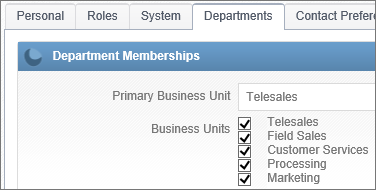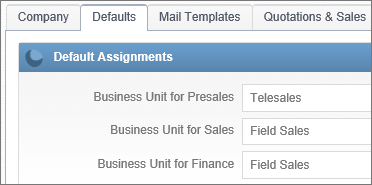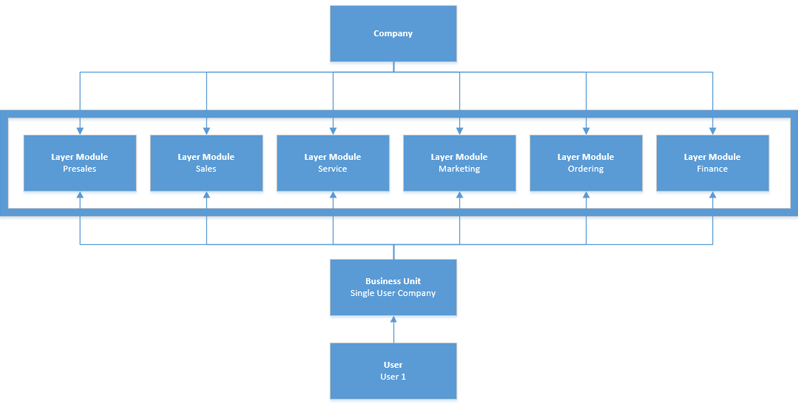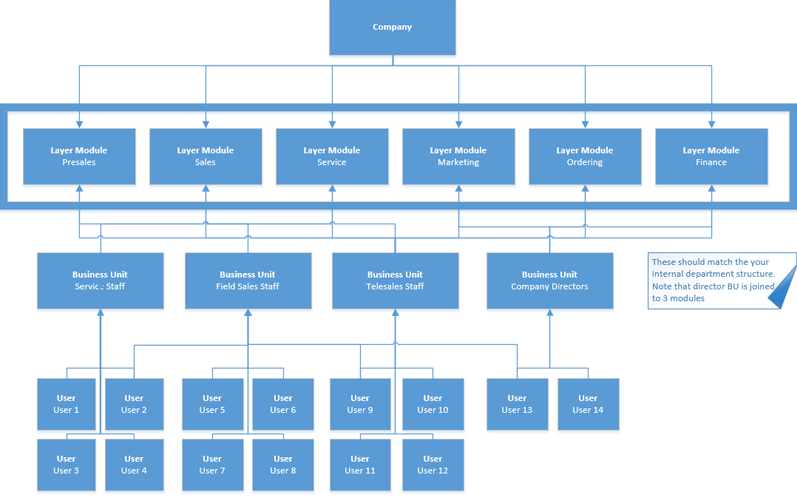There are two primary entities below "Company" level in The Layer. These are users and business units.
Users are members of staff who use The Layer.
Business units represent logical 'departments' within the company to which users can be attached and act as containers for users. They're useful to ensure the users are included in relevant notification schemes, are included in lists for particular tasks and feature in departmental widgets. Business units are very different to roles and role groups in the sense that they are designed to 1) give an organisation a high level structure and 2) provide translation between a company's departments and Layer modules. For granular control over user accounts, see role groups and roles.
From an individual user profile, a Layer user can be attached to a primary business unit, as well as having the ability to add additional memberships for users who work across multiple departments.

Mapping business units to Layer modules
It's important to map business units to Layer modules in order to ensure your users are attached to the correct groups. This is important to ensure the users receive the relevant notifications and are included in lists for particular functionality.

Below are examples of business units configured for a single user organisation, followed by a diagram showing best practice for a business with 3 departments, telesales, field sales and service, with the directors performing the marketing, finance and ordering roles.
Example 1: Single user organisation

Example 2: Multiple department organisation

Below is a list of the functions enabled for each business unit.
Commission Request
Users mapped via core Commission Requests BU will:
- Receive internal "commission Request Received/ Updated" notifications
Presales
Users mapped via core Presales BU:
- Appear in the list for lead reassignments
- Appear in the list for lead delegations
- Are configurable for appointment targets
- Are shown in the upcoming expiries widget
- Are shown in the appointment feedback (team) widget
- Are shown in the appointment bookings (team) widget
- Are shown in the completed calls widget
- Are shown in the 'Leads opened' widget
- Are shown in the Telesales Performance widget
Sales
Users mapped via core Sales BU:
- Appear in the list of potential appointment attendees in appointment tasks
- Are shown in the list of neglected feedback (team) widget
- Are shown on sales leader board widget
- Are shown on opportunities by status widget
- Are shown on quotations by status widget
- Are shown on the sale by agent widget
- Appear on shared calendars for sales/ appointments
Service
Users mapped via core Service BU:
- Are available for selection on the On-duty portal staff global aside widget
- Are shown on the case by category widget
- Are shown on the case by company widget
- Are shown on the case by status widget (user/team)
- Are shown on the cases overdue widget
- Are shown on the ratings widget sets
- Are available as case watchers
In conclusion by mapping users to business units this is also useful for sending emails via workflow for groups.
